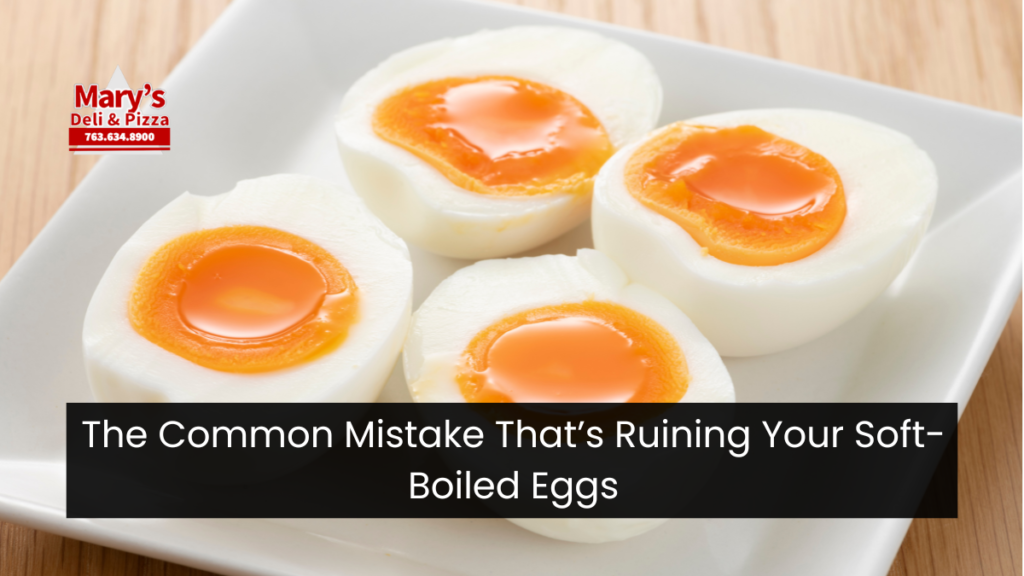Soft-boiled eggs are a breakfast staple that can be enjoyed in various ways—from runny yolks perfect for dipping toast to jammy centers ideal for topping salads or ramen. While the process may seem straightforward, there’s one crucial mistake that can ruin your soft-boiled eggs: overcooking. With just a little attention to timing and technique, you can achieve perfectly cooked eggs every time.
Why Timing Matters
The difference between perfectly soft-boiled eggs and overcooked ones comes down to just a couple of minutes. Soft-boiled eggs have fully set whites with yolks that remain soft—ranging from runny to jammy. If you boil your eggs even a minute longer than intended, the yolk can become firm, transitioning into hard-boiled territory.
According to experts, one of the main reasons eggs turn out overcooked is not setting the timer or miscalculating cooking time. Nelson Serrano-Bahri, a renowned chef, explains, “Overcooking your eggs and not timing your cooking process properly is one of the biggest mistakes you can make when soft-boiling an egg.”
The Correct Technique For Soft-Boiled Eggs
To achieve the ideal texture, precision is key. Here’s a step-by-step guide to the correct technique for soft-boiling eggs:
- Start with cold water: Place the eggs in a pot and cover them with cold water. This ensures even cooking.
- Bring to a boil: Heat the water until it reaches a rolling boil.
- Simmer, don’t boil: Once boiling, reduce the heat to a gentle simmer and start your timer. This is crucial for maintaining the desired consistency.
- Set the timer: Depending on your preference for runny or jammy yolks, you’ll need to adjust the cooking time.
Cooking Times Based On Yolk Preferences:
- For runny yolks: Cook for 4 minutes. This will leave the yolks soft and the whites slightly undercooked.
- For jammy yolks: Cook for 6 minutes. The whites will be fully set, while the center of the egg remains creamy and jammy.
Once the timer goes off, immediately transfer the eggs to an ice bath to stop the cooking process. This ensures that your eggs stay perfectly soft-boiled.
Why Use An Ice Bath?
An ice bath is essential for halting the cooking process. Eggs continue cooking even after they’re removed from hot water, which can quickly turn a soft-boiled egg into a hard-boiled one. By immersing them in ice water, you not only maintain the desired texture but also make peeling easier.
Common Mistakes When Cooking Soft-Boiled Eggs
- Skipping the Timer: As mentioned earlier, overcooking is the number one culprit behind ruining soft-boiled eggs. Always set a timer to ensure your eggs are cooked just right.
- Boiling at High Heat: Keep the heat to a gentle simmer, not a rapid boil, to avoid uneven cooking and potential cracking.
- Not Using an Ice Bath: Failing to transfer the eggs to an ice bath can lead to overcooking, especially if you’re aiming for a runny yolk.
Variations Of Soft-Boiled Eggs
Different cooking times yield different results, but even small variations can make a huge difference. Below is a table showing how cooking times affect the final texture:
| Cooking Time | Yolk Consistency | White Consistency |
|---|---|---|
| 4 minutes | Runny | Slightly undercooked |
| 5 minutes | Semi-runny | Fully set |
| 6 minutes | Jammy | Fully set |
| 7 minutes | Firmer but creamy | Fully set |
The Versatility Of Soft-Boiled Eggs
Soft-boiled eggs are incredibly versatile, making them a fantastic addition to various meals. Here are some common ways to enjoy them:
- Dippy Eggs: Serve with toast soldiers for dipping.
- Ramen Topping: Add jammy eggs to ramen or noodle soups for extra richness.
- Salad Garnish: Top salads with soft-boiled eggs for a creamy, delicious burst of flavor.
- Breakfast Bowls: Pair with avocado, grains, and veggies for a healthy, filling breakfast.
Conclusion:
Mastering soft-boiled eggs comes down to timing and technique. By using a timer and following these simple tips, you can enjoy perfectly cooked eggs every time. Whether you like them runny or jammy, soft-boiled eggs are a versatile and delicious addition to any meal. So next time you make soft-boiled eggs, set that timer and avoid overcooking—your breakfast will thank you!
FAQs
1. What Is The Ideal Cooking Time For Runny Soft-Boiled Eggs?
For runny yolks, cook the eggs for about 4 minutes.
2. How Can I Ensure My Soft-Boiled Eggs Don’t Overcook?
Use a timer and immediately transfer the eggs to an ice bath after cooking.
3. What’s The Difference Between Soft-Boiled And Hard-Boiled Eggs?
Soft-boiled eggs have a soft or runny yolk, while hard-boiled eggs have a fully set yolk and white.
4. Can I Store Soft-Boiled Eggs?
Yes, you can refrigerate soft-boiled eggs, but they are best enjoyed fresh.
5. Why Do My Eggs Crack When Boiling?
This could happen if the water temperature changes too quickly. To prevent cracking, start the eggs in cold water and bring them to a boil gradually.






